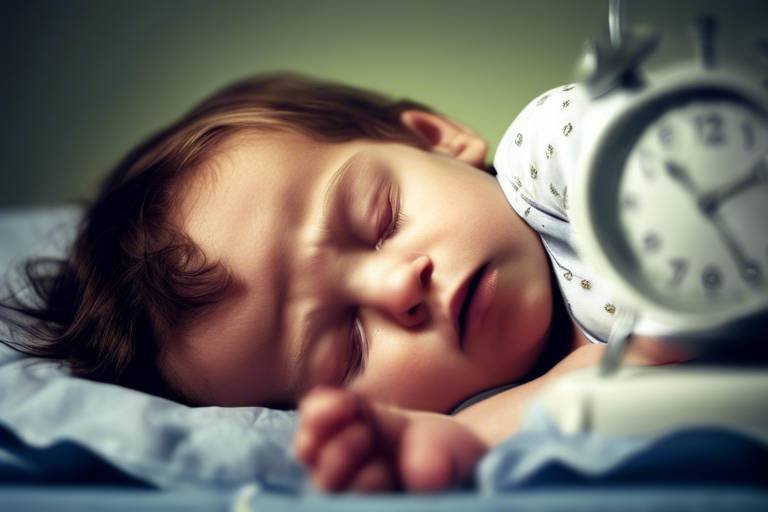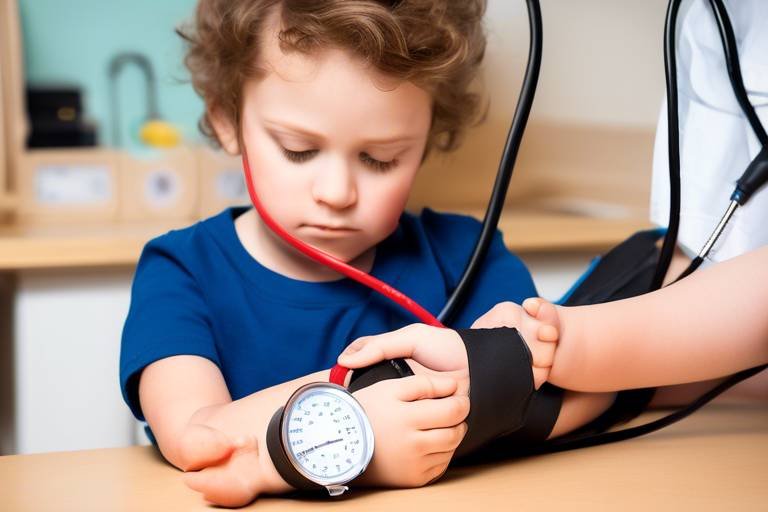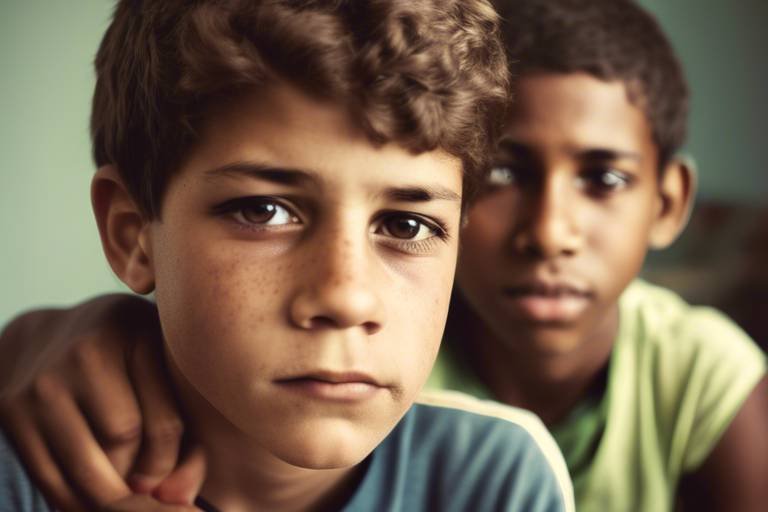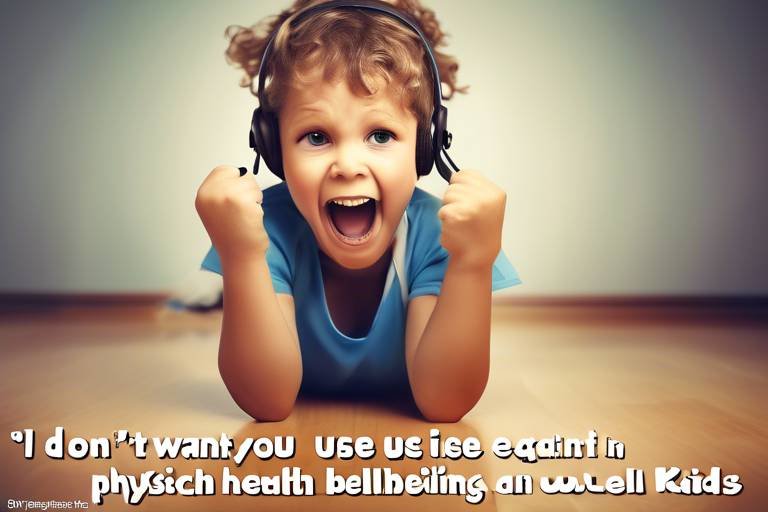Recognizing Signs of Sleep Disorders in Children
Sleep is a vital component of a child's growth and development, yet many parents may overlook the signs of sleep disorders that can disrupt this essential process. Just like a car needs fuel to run smoothly, children need quality sleep to thrive. Unfortunately, sleep disorders can be as sneaky as a cat burglar, creeping in and affecting a child’s overall well-being without immediate notice. By recognizing the signs early on, parents can take proactive steps to ensure their little ones get the restful sleep they deserve.
Imagine your child bouncing off the walls one moment and then suddenly crashing into a deep sleep the next. This erratic behavior can be a telltale sign of sleep issues lurking beneath the surface. Sleep disorders in children can manifest in various ways, from restless nights to daytime fatigue that seems to hang around like a persistent shadow. Understanding these signs is crucial, not only for the child's health but also for their emotional and social development.
Common sleep disorders affecting children include insomnia, where kids struggle to fall asleep or stay asleep; sleep apnea, characterized by breathing interruptions during sleep; and restless leg syndrome, which causes uncomfortable sensations in the legs, leading to restless nights. These disorders are not just minor inconveniences; they can have a profound impact on a child's life, affecting their mood, behavior, and even academic performance.
As a parent, it’s essential to be vigilant and look out for key symptoms that may indicate a sleep disorder. For instance, if your child frequently tosses and turns at night or wakes up multiple times, it might be time to investigate further. Additionally, excessive daytime sleepiness can manifest as irritability or difficulty concentrating, making it challenging for your child to engage in daily activities. Recognizing these signs early can help you address potential issues before they escalate.
In conclusion, being aware of the signs of sleep disorders in children is crucial for their overall health and happiness. By paying close attention to their sleep patterns and behaviors, parents can take the necessary steps to support their child's sleep needs, ensuring they grow up healthy, happy, and ready to take on the world.
- What are the most common sleep disorders in children?
The most common sleep disorders include insomnia, sleep apnea, and restless leg syndrome. Each disorder presents unique challenges that can impact a child's sleep quality.
- How can I tell if my child has a sleep disorder?
Look for signs such as difficulty falling asleep, frequent awakenings, excessive daytime sleepiness, and behavioral changes like irritability or mood swings.
- When should I seek help for my child's sleep problems?
If your child exhibits persistent symptoms, significant behavioral changes, or if their sleep patterns are affecting their quality of life, it’s important to consult a healthcare professional.
- What treatment options are available for sleep disorders in children?
Treatment options may include behavioral therapies, lifestyle changes, and, in some cases, medication. Consulting with a pediatrician can help tailor the best approach for your child's needs.

Understanding Sleep Disorders
This article explores the various signs and symptoms of sleep disorders in children, helping parents identify potential issues early on for better management and intervention.
When it comes to our little ones, sleep is as vital as the air they breathe. Sleep disorders in children can manifest in various ways, affecting not just their nightly rest but also their daily lives. Common sleep disorders include insomnia, sleep apnea, and restless leg syndrome. Each of these conditions can disrupt a child's sleep cycle, leading to a cascade of issues that can impact their health and development.
Did you know that nearly 30% of children experience some form of sleep disorder? This statistic is alarming, especially considering how crucial sleep is for a child's growth and cognitive function. For instance, insomnia can prevent a child from getting the restorative sleep they need, leading to fatigue and irritability during the day. Meanwhile, sleep apnea can cause a child to stop breathing momentarily during sleep, leading to poor oxygenation and fragmented rest. Lastly, restless leg syndrome can make it difficult for children to stay still at night, causing them to toss and turn instead of getting the rejuvenating sleep they require.
Understanding these disorders is the first step in ensuring our children get the quality sleep they need. The impact of sleep disorders goes beyond just feeling tired; they can lead to significant challenges in a child's life. For example, children suffering from these issues may struggle with concentration in school, leading to poor academic performance. They may also experience emotional instability, making them more prone to mood swings and irritability.
To give you a clearer picture, let’s look at a few key characteristics of these common sleep disorders:
| Sleep Disorder | Key Symptoms | Potential Impact |
|---|---|---|
| Insomnia | Difficulty falling or staying asleep | Fatigue, irritability, trouble concentrating |
| Sleep Apnea | Snoring, gasping for air during sleep | Daytime sleepiness, behavioral issues |
| Restless Leg Syndrome | Uncontrollable urge to move legs at night | Disrupted sleep, increased anxiety |
Recognizing these disorders early can be a game-changer. The sooner parents can identify the signs, the quicker they can seek the appropriate help for their child. After all, a well-rested child is not just happier but also more engaged and ready to tackle the challenges of the day.
Identifying key symptoms that may indicate a sleep disorder, such as difficulty falling asleep, frequent awakenings, and excessive daytime sleepiness, which can significantly affect a child's daily functioning.
Behavioral changes like irritability, mood swings, and difficulty concentrating can signal underlying sleep issues, emphasizing the importance of monitoring these signs for timely intervention.
Sleep disorders can lead to academic struggles, affecting a child's ability to focus, retain information, and perform well in school, necessitating early recognition and treatment.
Children with sleep disorders may experience difficulties in social settings, leading to challenges in forming friendships and participating in group activities due to fatigue and mood disturbances.
Physical symptoms such as snoring, gasping during sleep, or unusual movements can provide critical clues to the presence of sleep disorders, warranting further evaluation by healthcare professionals.
Guidelines for parents on when to seek professional help, including persistent symptoms, significant behavioral changes, and any concerns about a child’s sleep patterns that affect their quality of life.
The importance of consulting a pediatrician for proper diagnosis and treatment options, ensuring that any sleep disorder is addressed in a timely manner for optimal health outcomes.
An overview of various treatment options available for sleep disorders in children, including behavioral therapies, lifestyle changes, and, in some cases, medication, tailored to individual needs.
Q: What are the signs that my child may have a sleep disorder?
A: Look for symptoms such as difficulty falling asleep, excessive daytime sleepiness, irritability, and changes in behavior.
Q: When should I consult a doctor about my child's sleep?
A: If your child consistently struggles with sleep or shows significant behavioral changes, it's time to consult a pediatrician.
Q: Can sleep disorders affect my child's academic performance?
A: Yes, sleep disorders can lead to concentration issues and poor performance in school.

Common Symptoms to Look For
When it comes to sleep disorders in children, recognizing the symptoms early can make a significant difference in their overall well-being. Parents often find themselves in a challenging situation, trying to decipher whether their child's sleep patterns are just typical childhood behavior or if they indicate a deeper issue. It's essential to keep an eye out for key signs that may suggest the presence of a sleep disorder. These symptoms can range from difficulties falling asleep to excessive daytime sleepiness, and they can profoundly affect a child's daily life.
One of the most common indicators of sleep issues is the struggle to fall asleep. If your child is tossing and turning for extended periods or frequently complains about not being able to sleep, this could be a red flag. Additionally, frequent awakenings during the night can disrupt their sleep cycle, leaving them feeling groggy and irritable the next day. You might notice them waking up multiple times, often requiring assistance to settle back down. These interruptions can lead to a vicious cycle of fatigue and irritability, impacting their mood and behavior.
Another important symptom to consider is excessive daytime sleepiness. If your child is consistently tired during the day, struggles to stay awake in class, or seems unusually lethargic, this could suggest that they are not getting quality sleep at night. In some cases, children may even fall asleep during activities that require their attention, such as homework or family meals. This can be particularly concerning, as it might indicate that their sleep is being disrupted or insufficient.
It's also crucial to observe any behavioral changes that may arise in conjunction with these sleep issues. For instance, if your child exhibits irritability, mood swings, or difficulty concentrating, these can all be signs of sleep deprivation. Just like a car running on empty, a child who doesn’t get enough rest may struggle to function effectively. These behavioral symptoms can be subtle at first, but they can escalate if the underlying sleep disorder is not addressed.
In addition to behavioral signs, physical symptoms can also provide critical clues. Parents should be vigilant for signs like snoring, gasping for air during sleep, or even unusual movements like twitching or kicking. These symptoms might suggest conditions such as sleep apnea or restless leg syndrome, which require further evaluation by healthcare professionals. It’s like a puzzle; each piece of information can help paint a clearer picture of what might be going on with your child's sleep health.
In summary, being observant and proactive about your child’s sleep patterns can help in identifying potential sleep disorders. If you notice a combination of these symptoms, it’s essential to take action. Early intervention can lead to better management and improved quality of life for your child.
Q: How can I tell if my child has a sleep disorder?
A: Look for signs such as difficulty falling asleep, frequent awakenings, excessive daytime sleepiness, irritability, and physical symptoms like snoring or gasping during sleep.
Q: What should I do if I suspect my child has a sleep disorder?
A: It's important to consult with a pediatrician who can provide a proper diagnosis and recommend treatment options tailored to your child's needs.
Q: Are sleep disorders common in children?
A: Yes, sleep disorders can affect children of all ages, and recognizing the symptoms early can help in managing them effectively.

Behavioral Changes
When it comes to our little ones, their behavior can often be a window into their overall health. If you’ve noticed your child becoming more irritable or experiencing sudden mood swings, it might be time to take a closer look at their sleep patterns. Sleep disorders can manifest in various ways, and behavioral changes are often one of the first signs that something might be off. Think of it like a car that starts making strange noises; ignoring it could lead to bigger problems down the road.
Children suffering from sleep disorders may struggle with concentration and focus. Have you ever felt so tired that you could barely keep your eyes open during a meeting? Imagine how a child feels trying to stay alert during a school lesson after a restless night. These difficulties can lead to academic struggles, making it hard for them to keep up with their peers. It’s like trying to run a race with a heavy backpack; it just doesn’t work well!
Sometimes, these behavioral changes can be subtle but still significant. For example, a child who used to be outgoing and social might start withdrawing from friends or activities they once enjoyed. This change can be alarming for parents. It's crucial to monitor these signs closely. Here are a few common behavioral changes to look for:
- Irritability: Frequent outbursts or a short temper.
- Mood Swings: Sudden changes in emotions without clear reasons.
- Difficulty Concentrating: Trouble focusing on tasks or following instructions.
- Withdrawal: Avoiding friends or activities they once loved.
Addressing these behavioral changes early on can make a big difference. Just like a gardener tends to their plants to ensure they flourish, parents need to nurture their children's emotional and mental health. If you notice these signs, don’t hesitate to reach out for help. After all, a well-rested child is not only happier but also more likely to thrive in school and in life.
Q1: What are some common signs of sleep disorders in children?
A1: Common signs include difficulty falling asleep, frequent awakenings, excessive daytime sleepiness, irritability, and mood swings.
Q2: When should I consult a pediatrician?
A2: If your child exhibits persistent symptoms, significant behavioral changes, or any concerns regarding their sleep patterns that affect their quality of life, it’s time to seek professional help.
Q3: What treatment options are available for sleep disorders in children?
A3: Treatment options can include behavioral therapies, lifestyle changes, and, in some cases, medication tailored to the individual needs of the child.

Impact on School Performance
Sleep disorders in children can have a profound impact on their academic performance. Imagine trying to drive a car with a foggy windshield; that's what it feels like for a child struggling to focus in class due to sleep issues. When children do not get the quality sleep they need, their cognitive functions—such as attention span, memory retention, and problem-solving skills—are severely compromised. This can lead to a cascade of challenges in the classroom.
For instance, a child suffering from sleep apnea may frequently wake up during the night, leading to a lack of restorative sleep. As a result, they may exhibit signs of excessive daytime sleepiness, making it difficult for them to stay awake and engaged during lessons. Teachers often notice that these children struggle to concentrate on tasks, leading to incomplete homework and lower grades. In fact, studies suggest that children with sleep disorders are at a higher risk of underperforming academically compared to their peers.
Furthermore, the effects of sleep disorders extend beyond just academic struggles. Children may also find it challenging to participate in group discussions or collaborate on projects due to feelings of fatigue and irritability. This can create a cycle where their performance in school diminishes, leading to a lack of confidence and motivation. The importance of recognizing these issues cannot be overstated, as early intervention can help mitigate these challenges.
Here are some specific ways sleep disorders can impact school performance:
- Difficulty in Retaining Information: Sleep is essential for memory consolidation, and without it, children may struggle to remember what they've learned.
- Poor Attention Span: Fatigue can lead to a lack of focus, making it hard for children to follow lessons or instructions.
- Increased Absenteeism: Health issues stemming from sleep disorders can lead to frequent absences, further hindering academic progress.
In summary, the impact of sleep disorders on a child's school performance is significant and multifaceted. Parents and educators must work together to identify potential sleep issues early on, ensuring that children receive the support they need to thrive academically and socially.
Q: How can I tell if my child has a sleep disorder?
A: Look for symptoms such as difficulty falling asleep, frequent awakenings, excessive daytime sleepiness, and behavioral changes like irritability or mood swings.
Q: What should I do if I suspect my child has a sleep disorder?
A: Consult your pediatrician for a proper evaluation and advice on the next steps, including potential treatments.
Q: Are sleep disorders common in children?
A: Yes, sleep disorders such as insomnia, sleep apnea, and restless leg syndrome are relatively common among children and can significantly affect their daily lives.
Q: Can sleep disorders affect my child's social life?
A: Absolutely! Children with sleep disorders may struggle to engage in social activities due to fatigue and mood disturbances, which can impact their ability to form friendships.

Social Interaction Issues
Children with sleep disorders often face significant challenges in social settings, which can ripple through their friendships and group activities. Imagine a child who is always tired; their energy levels are low, and they may struggle to keep up with their peers during playtime or group projects at school. This persistent fatigue can make them less enthusiastic about social interactions, leading to feelings of isolation or exclusion.
Moreover, sleep disorders can cause mood disturbances, which can manifest as irritability or anxiety. These emotional fluctuations can make it difficult for children to engage positively with their friends. For instance, a child who is normally cheerful might suddenly become withdrawn or snappy after a night of poor sleep. Such behavioral changes can confuse their peers, making it hard for them to form meaningful connections.
Additionally, children with sleep issues may exhibit difficulty in communication. They might struggle to express their thoughts clearly or may not be able to focus on conversations. This can lead to misunderstandings and frustration, both for the child and their friends. Picture a scenario where a child is trying to explain a game but keeps losing track of their thoughts; this not only frustrates them but can also alienate their friends who may not understand what’s happening.
It's essential for parents to recognize these social interaction issues early on. By doing so, they can take proactive steps to address the underlying sleep disorders. Open communication with teachers and caregivers can also help create a supportive environment where the child feels safe to express their struggles.
In conclusion, sleep disorders can significantly hinder a child's ability to interact socially, leading to a cascade of emotional and relational challenges. As parents, being vigilant about these signs and seeking timely intervention can make a world of difference in helping their children thrive both socially and emotionally.
- What are the signs of sleep disorders in children?
Common signs include difficulty falling asleep, frequent awakenings, excessive daytime sleepiness, and behavioral changes like irritability. - When should I consult a pediatrician?
If your child exhibits persistent sleep issues or significant behavioral changes, it's crucial to seek professional advice. - What treatment options are available for sleep disorders?
Treatment can include behavioral therapies, lifestyle changes, and in some cases, medication tailored to the child's needs. - How can sleep disorders affect my child's academic performance?
Sleep disorders can lead to difficulties in concentrating, retaining information, and overall academic struggles.

Physical Symptoms
When it comes to recognizing sleep disorders in children, can serve as vital indicators. Parents might notice various signs that suggest their child is not getting the restful sleep they need. For instance, snoring is often dismissed as a trivial issue, but it can be a red flag for conditions like sleep apnea. This condition occurs when a child's breathing is interrupted during sleep, leading to poor quality rest and daytime fatigue.
Additionally, you might observe your child gasping or choking during sleep. These episodes can be alarming and are often accompanied by loud snoring. If your child frequently experiences these symptoms, it's crucial to consult a healthcare professional. Other physical symptoms to keep an eye out for include unusual movements during sleep, such as kicking, thrashing, or even sleepwalking. These behaviors can be signs of disorders like restless leg syndrome or other sleep-related issues.
Let's break down some common physical symptoms that may indicate a sleep disorder:
- Snoring: While common, persistent snoring can indicate airway obstruction.
- Choking or Gasping: These signs during sleep can indicate serious breathing issues.
- Unusual Movements: Excessive tossing and turning may suggest discomfort or restlessness.
- Daytime Fatigue: If your child often seems tired or irritable during the day, it could be due to poor sleep quality.
Recognizing these symptoms early can make a significant difference in your child's health and well-being. A child's inability to get restful sleep can not only impact their physical health but can also lead to emotional and behavioral challenges. If you find that your child exhibits any of these symptoms consistently, it’s time to take action. The sooner you identify and address these issues, the better the chances are for effective management and improvement.
Don’t hesitate to reach out to a pediatrician if you notice these physical symptoms. They can provide a thorough evaluation and recommend appropriate interventions. Remember, addressing sleep disorders early can pave the way for a healthier, happier child.
Q: What are the most common sleep disorders in children?
A: Common sleep disorders include insomnia, sleep apnea, and restless leg syndrome.
Q: How can I tell if my child has a sleep disorder?
A: Look for signs such as snoring, gasping during sleep, excessive daytime sleepiness, and behavioral changes.
Q: When should I seek help for my child's sleep issues?
A: If your child exhibits persistent symptoms that affect their daily life, it’s time to consult a healthcare professional.
Q: What treatments are available for sleep disorders in children?
A: Treatment options may include behavioral therapies, lifestyle changes, and in some cases, medication.

When to Seek Help
As a parent, it can be overwhelming to navigate the complexities of your child's health, especially when it comes to sleep. Sleep is crucial for a child's growth and overall well-being, and recognizing when to seek help for potential sleep disorders is vital. If you notice that your child is exhibiting persistent symptoms, it’s essential to take action. But what exactly should you look for?
Firstly, if your child experiences persistent sleep disturbances that last for more than a few weeks, it might be time to consult a healthcare professional. These disturbances could include trouble falling asleep, frequent awakenings during the night, or excessive daytime sleepiness. Consider how these behaviors impact your child's daily life. Are they struggling to stay awake during school? Are they irritable or moody? These signs can indicate that their sleep quality is suffering, and intervention may be necessary.
Another critical factor to consider is significant behavioral changes. If you notice that your child is becoming increasingly irritable, experiencing mood swings, or having trouble concentrating, these may be signs of an underlying sleep disorder. It’s like trying to drive a car with a flat tire; no matter how hard you push the gas pedal, you won’t get very far until you fix the problem. Similarly, if your child's sleep issues are left unaddressed, their overall development and happiness can be severely affected.
Additionally, consider the impact of sleep issues on your child's social interactions. Children with sleep disorders may find it challenging to engage with peers, leading to difficulties in forming friendships or participating in group activities. If your child seems withdrawn or is avoiding social situations, it’s worth investigating whether sleep problems are contributing to these issues.
To sum it up, here are some key indicators that suggest it’s time to seek professional help:
- Persistent sleep disturbances lasting more than a few weeks
- Significant changes in behavior or mood
- Excessive daytime sleepiness affecting daily activities
- Challenges in social interactions or friendships
Consulting a pediatrician is a crucial step in addressing these concerns. They can provide a thorough evaluation and recommend appropriate treatment options tailored to your child's needs. Early recognition and intervention can lead to better outcomes, allowing your child to enjoy a more vibrant and fulfilling life. Remember, your child's health is a priority, and taking action sooner rather than later can make all the difference.
Q: How can I tell if my child has a sleep disorder?
A: Look for persistent symptoms such as difficulty falling asleep, frequent awakenings, excessive daytime sleepiness, and behavioral changes like irritability or mood swings.
Q: When should I consult a pediatrician?
A: If your child exhibits any of the symptoms mentioned above for an extended period, or if their sleep issues are affecting their daily life, it’s time to seek professional help.
Q: What treatments are available for sleep disorders in children?
A: Treatment options may include behavioral therapies, lifestyle changes, and in some cases, medication. A pediatrician can help determine the best course of action.
Q: Can sleep disorders affect my child's academic performance?
A: Yes, sleep disorders can significantly impact a child's ability to focus, retain information, and perform well in school, making early recognition and treatment essential.

Consulting a Pediatrician
When it comes to your child's health, especially concerning sleep disorders, consulting a pediatrician can be a game changer. You might wonder, "When should I take my child to the doctor?" Well, if you notice persistent symptoms such as difficulty falling asleep, frequent awakenings, or excessive daytime sleepiness, it's time to pick up the phone. These signs can often be overlooked, but they can significantly impact your child's overall well-being and development.
A pediatrician is not just any doctor; they specialize in children's health, making them the best resource for identifying sleep disorders. They can conduct a thorough evaluation, which may include asking about your child's sleep habits, daily routines, and any behavioral changes you've observed. It's essential to provide as much detail as possible during this consultation. For instance, you might want to mention:
- How long your child has been experiencing sleep issues
- Any specific behaviors that seem out of the ordinary
- Changes in mood or academic performance
- Family history of sleep disorders
After a comprehensive assessment, your pediatrician may recommend a variety of diagnostic tests, such as a sleep study, to better understand your child's sleep patterns. This is crucial because sleep disorders can often masquerade as other issues, leading to misdiagnosis. By pinpointing the exact nature of the problem, your pediatrician can suggest tailored treatment options that may include:
- Behavioral therapies: Techniques to improve sleep hygiene and establish a healthy sleep routine.
- Lifestyle changes: Adjustments in diet, exercise, and screen time that can promote better sleep.
- Medication: In some cases, medications may be prescribed to address specific sleep disorders.
Remember, early intervention is key. By consulting a pediatrician promptly, you are taking a proactive step towards ensuring your child's health and happiness. Don't hesitate to seek professional help; after all, a well-rested child is a happier, healthier child. The journey to better sleep can start with just one conversation.
Q: How do I know if my child has a sleep disorder?
A: Look for signs such as difficulty falling asleep, frequent awakenings, excessive daytime sleepiness, and behavioral changes like irritability or mood swings.
Q: What should I discuss with the pediatrician?
A: Discuss your child's sleep habits, any unusual behaviors, family history of sleep disorders, and how these issues are affecting their daily life.
Q: Are sleep disorders common in children?
A: Yes, sleep disorders are relatively common in children and can significantly impact their health, behavior, and academic performance if left untreated.
Q: Can sleep disorders be treated?
A: Yes, with the right diagnosis and treatment plan, many sleep disorders can be effectively managed through behavioral therapies, lifestyle changes, and, in some cases, medication.

Potential Treatment Options
When it comes to addressing sleep disorders in children, there isn't a one-size-fits-all solution. Each child is unique, and their treatment should be tailored to their specific needs. Understanding the various treatment options available can empower parents to make informed decisions that can significantly improve their child's sleep quality and overall well-being.
One of the most effective approaches is through behavioral therapies. These therapies focus on modifying the child's sleep environment and habits. For instance, establishing a consistent bedtime routine can signal to the child that it's time to wind down. This may include activities such as reading a story, dimming the lights, or engaging in calming exercises. Behavioral therapies are often the first line of defense and can yield positive results without the need for medication.
In addition to behavioral strategies, lifestyle changes can play a crucial role in improving sleep quality. This might involve:
- Limiting screen time before bed, as blue light can interfere with melatonin production.
- Encouraging physical activity during the day, which can help children feel more tired at night.
- Creating a sleep-friendly environment by ensuring the child’s bedroom is dark, quiet, and cool.
In some cases, medication might be necessary, especially if a sleep disorder is severe or persistent. However, this should always be a last resort and done under the guidance of a healthcare professional. Medications can include melatonin supplements or other prescription drugs that help regulate sleep patterns. It's essential to have a thorough discussion with a pediatrician to weigh the benefits and risks of any medication.
Ultimately, the goal of any treatment plan should be to enhance the child's quality of life. Regular follow-up appointments with healthcare providers can help monitor progress and make adjustments to the treatment plan as needed. Remember, early intervention is key; addressing sleep issues promptly can lead to better outcomes in a child's development, behavior, and overall health.
Q: How can I tell if my child has a sleep disorder?
A: Look for signs such as difficulty falling asleep, frequent awakenings during the night, excessive daytime sleepiness, and behavioral changes like irritability or difficulty concentrating.
Q: When should I seek professional help for my child's sleep issues?
A: If your child exhibits persistent symptoms or significant behavioral changes that impact their daily life, it's important to consult a healthcare professional.
Q: Are there non-medication options available for treating sleep disorders?
A: Yes, behavioral therapies and lifestyle changes are often effective in managing sleep disorders without the need for medication.
Q: Can sleep disorders affect my child's academic performance?
A: Absolutely! Sleep disorders can lead to difficulties in concentration and memory, which can hinder a child's ability to perform well in school.
Q: Is it safe to give my child melatonin supplements?
A: Melatonin can be safe for children, but it's crucial to consult with a pediatrician before starting any supplement to ensure it's appropriate for your child's specific situation.
Frequently Asked Questions
- What are the common signs of sleep disorders in children?
Common signs of sleep disorders in children include difficulty falling asleep, frequent awakenings during the night, excessive daytime sleepiness, and noticeable behavioral changes such as irritability or mood swings. If you notice your child struggling with these issues, it may be time to investigate further.
- How can sleep disorders affect a child's school performance?
Sleep disorders can significantly impact a child's ability to focus, retain information, and perform academically. When children are tired, they may struggle to concentrate in class, leading to lower grades and decreased participation in school activities.
- When should I seek help for my child's sleep issues?
If your child exhibits persistent symptoms like difficulty sleeping or excessive daytime sleepiness that affect their daily life, it's essential to consult a healthcare professional. Early intervention can lead to better management of sleep disorders and improved overall health.
- What types of sleep disorders are most common in children?
Some of the most common sleep disorders in children include insomnia, sleep apnea, and restless leg syndrome. Each of these conditions can have unique symptoms and may require different treatment approaches.
- How can I help my child improve their sleep habits?
To help your child improve their sleep habits, establish a consistent bedtime routine, create a comfortable sleep environment, and limit screen time before bed. Encouraging relaxation techniques, like reading or listening to calming music, can also be beneficial.
- What should I expect during a pediatric sleep consultation?
During a pediatric sleep consultation, the doctor will review your child's sleep history, discuss any symptoms or concerns, and may recommend a sleep study if necessary. This comprehensive evaluation helps identify the underlying cause of sleep issues and guides appropriate treatment options.
- Are there treatment options available for sleep disorders in children?
Yes, treatment options for sleep disorders in children can include behavioral therapies, lifestyle changes, and in some cases, medication. The best approach will depend on the specific disorder and your child's individual needs.



















